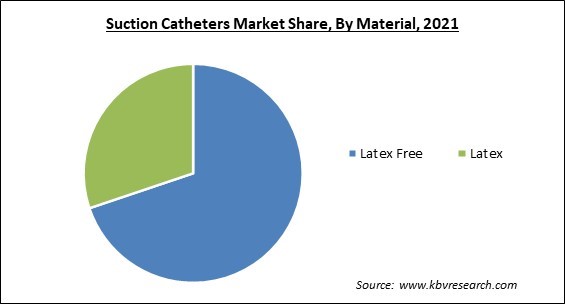The Global Suction Catheters Market size is expected to reach $629.5 million by 2028, rising at a market growth of 8.4% CAGR during the forecast period.
Suction catheters are medical tools used to remove biological fluids from the upper airway, like mucus or saliva. A collection canister or suction machine is connected to a suction catheter. The ideal catheters minimize tissue stress while maximizing secretion evacuation. The construction material, frictional resistance, size (diameter and length), form, and location of the aspirating holes are specific characteristics of the catheters.

It is desirable for a catheter to have a hole at the proximal end that can be opened to let the room air in, balancing the vacuum and cutting off the vacuum device. The catheter lumen should extend beyond the proximal opening. The correct suction catheter is essential to perform a task as they aid in avoiding emergencies before they happen or provide life-saving therapy when a person can't adequately breathe on their own.
When a patient is receiving dental care, a suction catheter may help avoid aspiration, especially if the individual is experiencing hallucinations. Suctioning may be required for patients who are at risk of aspiration, like those who have pneumonia, persistent vomiting, or maybe a bloody airway. Prompt suctioning can limit the number of pollutants that reach the lungs and resume normal airway function in patients who have previously aspirated.
Cleansing the airway of pollutants can save lives, particularly in those with weakened immune systems. Illnesses like aspiration pneumonia brought on by inhaled pollutants, provide the biggest risk from aspiration rather than choking. Aspiration has a mortality rate of roughly one-fifth, however, with quick medical attention, the rate is significantly lowered.
Suction catheter demand has increased as a result of greater awareness of respiratory conditions brought on by the COVID-19 pandemic. The pandemic had an impact on every industry's supply chain. Due to the low demand caused by the pandemic, a number of companies experienced a scarcity of goods stocks and experienced tremendous growth. However, with the COVID-19 lockdown restrictions lifted, the reopening of manufacturing plants, and ongoing patient visits, the pace of the healthcare system has resumed its normal course. It is anticipated that the catheter industry will soon return to normal as a result of the recent launches of catheter devices.
There has been a rise in cases of chronic respiratory disorders like lung cancer, chronic obstructive pulmonary disease (COPD), acute lower respiratory tract infections, and asthma. Aspiration, secondary respiratory infections, and pneumonia are among the risks that are increased by long-term respiratory diseases such as COPD. When these patients are unable to remove secretions on their own, a suction catheter can aid in clearing the airway, eventually requiring regular airway clearing. Patients with COPD create an excessive amount of sputum, which can obstruct the airway and end up making breathing challenging.
One of the main concerns facing emerging economies worldwide is the growing older population. It is also projected that the prevalence of chronic conditions in the elderly, like peripheral arterial disease, heart disease, and venous thromboembolism, will fuel market expansion for catheters. According to a study by the Centers for Disease Control and Prevention, peripheral vascular disease affected more than 19.1% of people aged 55 to 65 worldwide in 2020.
Compared to large-bore suction catheters, the Yankauer has lesser suction rates. The Yankauer's smaller internal diameter when compared to larger-bore catheters is most likely responsible for these decreased suction rates. Secondly, the Yankauer can occlude more readily than large-bore catheters. This is demonstrated by the fact that even improvised large-bore suction catheters, created by joining a meconium aspirator to an endotracheal tube (ETT) had faster suction rates. A lot of Yankauer catheters feature vent holes that, if accidentally left open, will reduce suction rates.

Based on type, the suction catheters market is categorized into closed suction catheters and yankauer suction catheters. The closed suction catheter segment procured the highest revenue share in the suction catheters market in 2021. Closed suction catheters serve to lessen discomfort and cut down on the chance of infection. A delivery technique that incorporates a T-piece closed suction catheter with a bidirectional catheter is also effective, according to a Respiratory Care study.
On the basis of material, the suction catheters market is bifurcated into latex and latex free. The latex segment recorded a substantial revenue share in the suction catheters market in 2021. In comparison to any other material used to make a catheter, latex suction catheters are built entirely of red rubber and offer the greatest degree of flexibility. Since they are intended to be radiopaque, scanners can easily see them. To aid in guiding the catheter in the patient's tracheobronchial area, a thicker region is offered right before the distal end, which is also in the shape of a cylindrical section.
Based on end-use, the suction catheters market is divided into hospitals, ambulatory care centers, and others. The hospital segment garnered the maximum revenue share in the suction catheter market in 2021. The tools and respiratory medical supplies needed for executing airway management operations are provided by hospitals. Suction catheter demand in hospitals is expected to be driven by the increased rate of inpatient admissions.
| Report Attribute | Details |
|---|---|
| Market size value in 2021 | USD 368.9 Million |
| Market size forecast in 2028 | USD 629.5 Million |
| Base Year | 2021 |
| Historical Period | 2018 to 2020 |
| Forecast Period | 2022 to 2028 |
| Revenue Growth Rate | CAGR of 8.4% from 2022 to 2028 |
| Number of Pages | 174 |
| Number of Tables | 329 |
| Report coverage | Market Trends, Revenue Estimation and Forecast, Segmentation Analysis, Regional and Country Breakdown, Companies Strategic Developments, Company Profiling |
| Segments covered | Type, Material, End-use, Region |
| Country scope | US, Canada, Mexico, Germany, UK, France, Russia, Spain, Italy, China, Japan, India, South Korea, Singapore, Malaysia, Brazil, Argentina, UAE, Saudi Arabia, South Africa, Nigeria |
| Growth Drivers |
|
| Restraints |
|
On the basis of region, the suction catheters market is analyzed across North America, Europe, Asia Pacific, and LAMEA. The North America segment acquired the highest revenue share in the suction catheters market in 2021. Suction catheter sales in the region are being driven by a rise in player initiatives and consumer awareness, as well as a rise in market participants' business expansion. One of the market participants for suction catheters, BD, has teamed up with the Advanced Medical Technology Association (AdvaMed) to promote diversity in the U.S. medical technology sector.
Free Valuable Insights: Global Suction Catheters Market size to reach USD 629.5 Million by 2028
The market research report covers the analysis of key stake holders of the market. Key companies profiled in the report include ICU Medical, Inc. (Smiths Medical), Becton, Dickinson and Company, Cardinal Health, Inc., B. Braun Melsungen AG, PFM Medical AG, Amsino International, Inc., Dynarex Corporation, IVOR SHAW Limited (Pennine Healthcare), and Medline Industries, Inc.
By Type
By Material
By End-use
By Geography
The global Suction Catheters Market size is expected to reach $629.5 million by 2028.
Increase In Respiratory Disorders And Equipment Portability are driving the market in coming years, however, Lowered Suction Capacity Of Yankauer Catheter And Confusion With The Use Of A Proper Catheter For Particular Treatments restraints the growth of the market.
ICU Medical, Inc. (Smiths Medical), Becton, Dickinson and Company, Cardinal Health, Inc., B. Braun Melsungen AG, PFM Medical AG, Amsino International, Inc., Dynarex Corporation, IVOR SHAW Limited (Pennine Healthcare), and Medline Industries, Inc.
The Latex Free segment acquired maximum revenue share in the Global Suction Catheters Market by Material in 2021 thereby, achieving a market value of $421.1 Million by 2028.
The North America market dominated the Global Suction Catheters Market by Region in 2021, and would continue to be a dominant market till 2028; thereby, achieving a market value of $263.6 Million by 2028.
Our team of dedicated experts can provide you with attractive expansion opportunities for your business.

